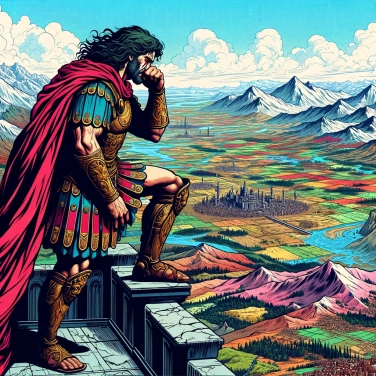It is reported that according to Plutarch, Alexander the Great was crying because there were no more new territories to conquer, which meant for him the end of his ambition for world domination.

For Alexander, his conquests went far beyond merely annexing territories. His ambition carried a strong symbolic dream: to unite the entire known world under his authority. Dominating lands became the living expression of his personal greatness, allowing him to claim the mythical legacy of Achilles and Heracles. He also wanted to demonstrate to the Greeks, Persians, and other peoples that he was unstoppable and chosen by the gods. His wars thus became a kind of initiatory ritual, proving to himself and others his exceptional worth.
Alexander the Great was raised with the idea that he was destined for great things. His successive victories reinforced what is called a complex of invincibility: he believed he could achieve anything. However, after a certain point, he hit a sort of psychological wall when he realized there was not much left to conquer. He found himself facing emptiness, with no new challenges to take on. This shock of confronting his own limits provoked a very strong emotional reaction, sometimes even leading to intense episodes of depression or sadness. This feeling reflects a kind of inner void: after having reached his highest goals, he struggled to accept that his quest could come to an end. The man who had always sought to push the boundaries of his glory suddenly found himself face to face with himself, forced to accept that his power is not infinite.
Alexandre had an overwhelming ambition, an almost obsessive drive to leave an eternal mark on history. This guy simply could not bear the idea of limits to his conquests or his glory. Always conquering more, accumulating ever greater military exploits, was like an attempt to surpass his mortal condition. His hidden fear was surely that of being forgotten after his death. So, when he realized that there was literally nothing left to conquer, it was as if harsh reality caught up with him: being human, limited, vulnerable. What he really wanted, deep down, was immortality through fame, a kind of infinite existence. Not being able to progress anymore was a serious blow to his ego and his dreams of eternity. That’s why, faced with the absence of new territories, Alexandre was overwhelmed by a kind of existential despair.
According to the famous Greek historian Plutarch, Alexander the Great was overwhelmed by strong, sometimes extreme emotions. He recounts an episode where Alexander openly weeps upon realizing that there were no more territories to conquer. These accounts describe a man with heightened feelings: he could suddenly shift from intense joy to sadness or explosive anger. According to the Roman author Quintus Curtius, Alexander was also capable of great compassion for his wounded soldiers. The image portrayed by these narratives is that of a passionate and very human leader, far from the cold and calculating stereotype often attributed to great conquerors.
The tears of Alexander the Great have remained famous because they symbolize something quite powerful: even the most powerful conquerors can feel an immense existential void upon reaching their ultimate goals. This anecdote has inspired philosophers and artists throughout the centuries, becoming a universal symbol of the infinite quest of mankind. In philosophy in particular, these tears often serve as a perfect illustration of the paradox between limitless ambition and the confrontation with human reality, which is limited and fragile. Even today, the scene of his tears is sometimes used to describe the sadness or vertigo felt when there are no more challenges to face, no more frontiers to cross. A moment that remains etched in the collective imagination as a reminder that, even at the pinnacle, one can deeply feel human dissatisfaction.
Alexander the Great received philosophical education from Aristotle during his adolescence. This education significantly influenced his worldview and ambition, instilling in him a deep desire to surpass mythical heroes like Heracles and Achilles.
According to Plutarch, Alexander profoundly admired the Greek hero Achilles, to the point of often sleeping with an annotated edition of the Iliad under his pillow during his military campaigns.
The famous philosopher Diogenes, known for living simply and despising glory, refused the generous offers of Alexander the Great, asking him only to step aside from the sun. Alexander is said to have later expressed his admiration for Diogenes' philosophy.
Although his military conquests are impressive, Alexander the Great is also famous for having founded more than 70 cities, the most well-known being Alexandria in Egypt, which quickly became a major center of knowledge and ancient culture.
Alexander the Great died very young, at the age of 32, in 323 BC in Babylon. Despite his short life, he profoundly impacted world history through his conquests and cultural legacy.
Even though this account is reported by various ancient historians, notably Plutarch, some scholars believe that it may contain a symbolic element, expressing more the deep psychology of a conqueror than literal tears.
The conquests of Alexander facilitated the massive spread of Greek (or Hellenistic) culture in the East, thereby promoting cultural, commercial, and philosophical exchanges that would have a lasting influence on the West and the Eastern world.
The emotions expressed by Alexandre, such as his tears related to the absence of new territories to conquer, likely reveal an individual grappling with his limitless ambition, the loneliness of being a supreme leader, and the fear of not leaving an everlasting mark in history.
Alexander the Great established a vast empire that stretched from Greece and Egypt to present-day India, covering over 5 million square kilometers.

No one has answered this quiz yet, be the first!' :-)
Question 1/5